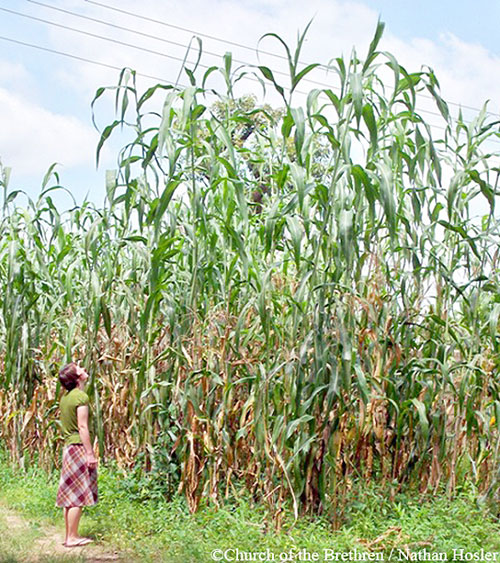By Carl and Roxane Hill
As the church’s Nigeria Crisis Response is in its second year, we are constantly seeking ways to help the church in Nigeria become more stable and help people recover from the violence and security issues they have had to endure over the last few years. As expected, there is no simple solution. But on our most recent visit to Nigeria one thing became apparent–the people of Nigeria are resilient and will only require a little assistance in certain areas to begin helping themselves.

A guinea corn farm in Nigeria — former mission worker Jenn Hosler cranes her neck to see the top of these tall stalks of grain, in a picture taken in 2010.
The Nigerians of the northeast are traditionally an agrarian people. Many make their living from farming or they subsidize their incomes or their diets by tending small farms or gardens.
Nigerian novelist Chinua Achebe, once considered Nigeria’s poet laureate, wrote a book titled, “Things Fall Apart.” The book was about the rhythms of life associated with the agricultural life in Nigeria and how things changed when white missionaries came bearing the gospel message. But what we learned from this book was the importance of the planting and harvest times to life in Nigeria. The planting comes as the annual rains begin in May and June. Then, after a productive growing season, the harvest takes place in the fall, providing food and incomes for the coming year.
Over the last few years, the violence and destruction carried out by Boko Haram have adversely affected farming as well as communities and church life. Now, since the return of Nigeria’s military to the area, tensions have lessened and people are returning to their traditional homes and villages. Among the biggest needs we see for the coming year are seeds, herbicides, and fertilizer so that planting can begin again on a large scale. Our plan is to help provide the means for the people to get back to the land and return to the one thing that has sustained them in the past–farming.
Through the Nigeria Crisis Fund, we are planning to provide money to purchase seeds, herbicides, and fertilizer that will assist Nigerians in helping themselves. If we can do this, then come harvest time this fall, we can reduce the amount of funds required to provide food distributions, and may be able to close out that phase of our response.
This new effort will not be a cure for everything in Nigeria. But it could be a huge step in restoring normal life in the northeast.
Thank you
Thank you to everyone who has given to the Nigeria Crisis Response. As of December 2015, the total raised was $4,141,474. These donations have done so much already–visit the Nigeria Crisis webpages at www.brethren.org/nigeriacrisis to see what we have accomplished together.
There is still a huge need for 2016. In addition to our new focus on providing seeds, herbicides, and fertilizer for Nigerian farmers to plant this spring, our efforts will move to rebuilding of destroyed homes and sustainability projects as displaced people continue to return to the northeast. Resources also will focus on education for the thousands of out-of-school children. And we will continue to support the EYN denomination as it faces a huge reduction in financial resources.
— Carl and Roxane Hill are co-directors of the Nigeria Crisis Response, a joint effort of the Church of the Brethren with Ekklesiyar Yan’uwa a Nigeria (EYN, the Church of the Brethren in Nigeria). For more information and to give to the effort go to www.brethren.org/nigeriacrisis .